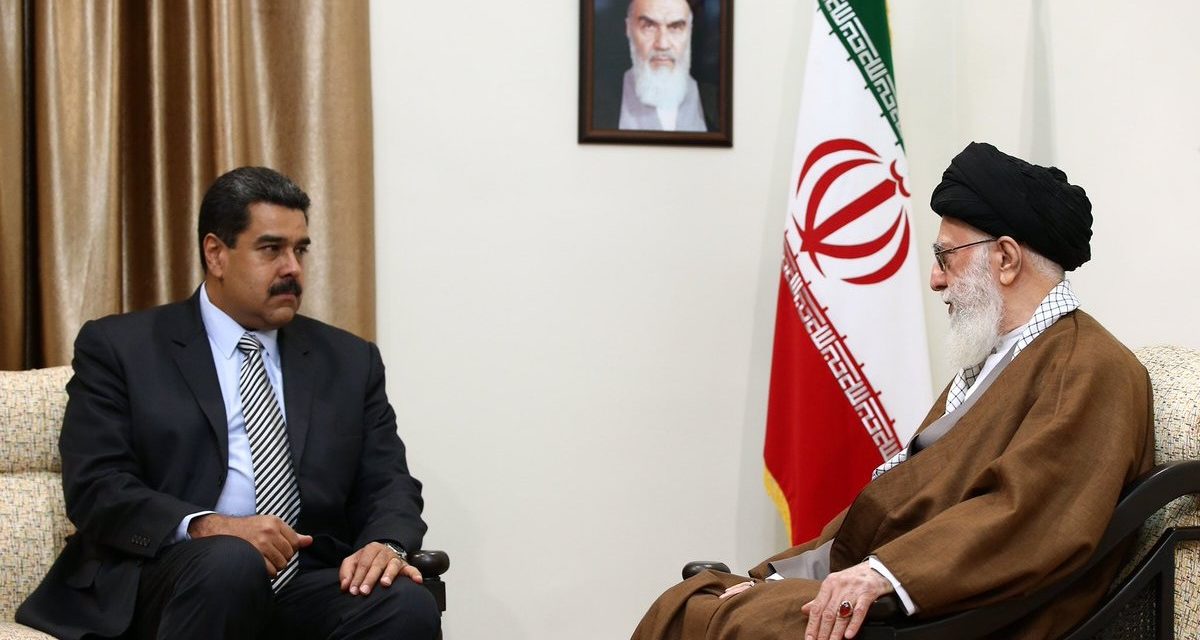PHOTO: Supreme Leader with Venezuelan President Nicolas Maduro on Saturday
LATEST
As Iran faces continuing economic difficulties, the Supreme Leader has shown his concern over low global prices for the country’s oil exports.
Meeting Venezuelan President Nicolas Maduro on Saturday, Ayatollah Khamenei declared, “The drop in oil prices is a coercive measure against countries independent from the US.” He then turned on oil producers, without naming any of them, such as Saudi Arabia:
In past when some Islamic countries stood against Zionist regime by an oil embargo, West made much ado about political use of oil. 1/2
— Khamenei.ir (@khamenei_ir) October 22, 2016
Today, same countries along with some OPEC members & regional states are using oil as a weapon in total compliance with US policies. 2/2
— Khamenei.ir (@khamenei_ir) October 22, 2016
Iran has counted on a rebound in oil exports for economic recovery, following implementation of the July 2015 nuclear deal, after years of stagnation and sanctions.
Iranian exports have risen 40% since January, nearing the level of 2012 before the strictest US and European sanctions were imposed.
However, the global oil price, which was as high as $112 per barrel in 2014, is still only about $50. While that is up from a low of around $27 earlier this year, it is far from sufficient for Iran to balance the Government budget and provide funds to stimulate the economy.
Iran has pressed OPEC producers to cut output, thus raising the price, while allowing Tehran an exemption. Saudi Arabia has offered a compromise in which Tehran can keep its current level — production of about 3.6 million barrels per day and exports of about 2 million bpd — through the end of the year while OPEC considers a reduction.
However, no agreement was reached at an OPEC meeting last month.
Khamenei: US “Seriously Crippled”
Defying Iran’s economic problems, the Supreme Leader used Saturday’s meeting to proclaim US weakness:
Some people imagine that U.S. is invincible, while this imagination is a big mistake.
— Khamenei.ir (@khamenei_ir) October 22, 2016
Constant mistakes U.S. authorities made during the last 15 years have now seriously crippled them in the region.
— Khamenei.ir (@khamenei_ir) October 22, 2016
He then upheld Venezuela, which is suffering from rampant inflation of almost 800%, as an example of strength challenging the Americans:
“The influence of Venezuela on anti-Arrogance movements in Latin America displays the high capacities of this country.”
Supreme Leader’s Representative Presses Rouhani Over Cabinet Changes
A representative of the Supreme Leader has maintained pressure on President Rouhani by commenting on last week’s change of three Cabinet Members.
In the first reshuffle since he became President in 2013, Rouhani replaced the Culture, Education, and Youth Affairs Ministers last week. The men had been under hardline pressure amid criticism of the President’s desire for political and cultural “openness”.
Abdullah Haji Sadeghi, the Supreme Leader’s liaison with the Revolutionary Guards, said he hoped the Cabinet changes are not simply “flattery and smiling at the people”:
The Ministry of Culture does not have a good record, and honestly, does not perform well on topics related to the Islamic Revolution. We hope this change will lead to dealing with [Western] cultural invasion, strengthening of the political system’s revolutionary, religious, and jihadi culture, and reinforcing of the country’s cultural institutions.
However, Sadeghi then pointedly accused Rouhani of politics over next May’s Presidential vote, saying the reshuffle “at least raises the suspicion” that it was to position the President for re-election.
Sadeghi’s statement comes amid a rhetorical battle between the Revolutionary Guards and Rouhani over the President’s pursuit of foreign investment for economic recovery. The Guards are concerned that the entry of foreign companies could challenge their position in areas such as Iran’s energy, transport, and engineering sectors.
Guards leader Mohammad Ali Jafari and Rouhani exchanged criticism this week before Friday Prayer leader, guided by the Supreme Leader’s office, sided with the Guards and jabbed at the President’s “constructive engagement”.
See Iran Daily, Oct 22: Rouhani Challenges Revolutionary Guards Over Foreign Investment

